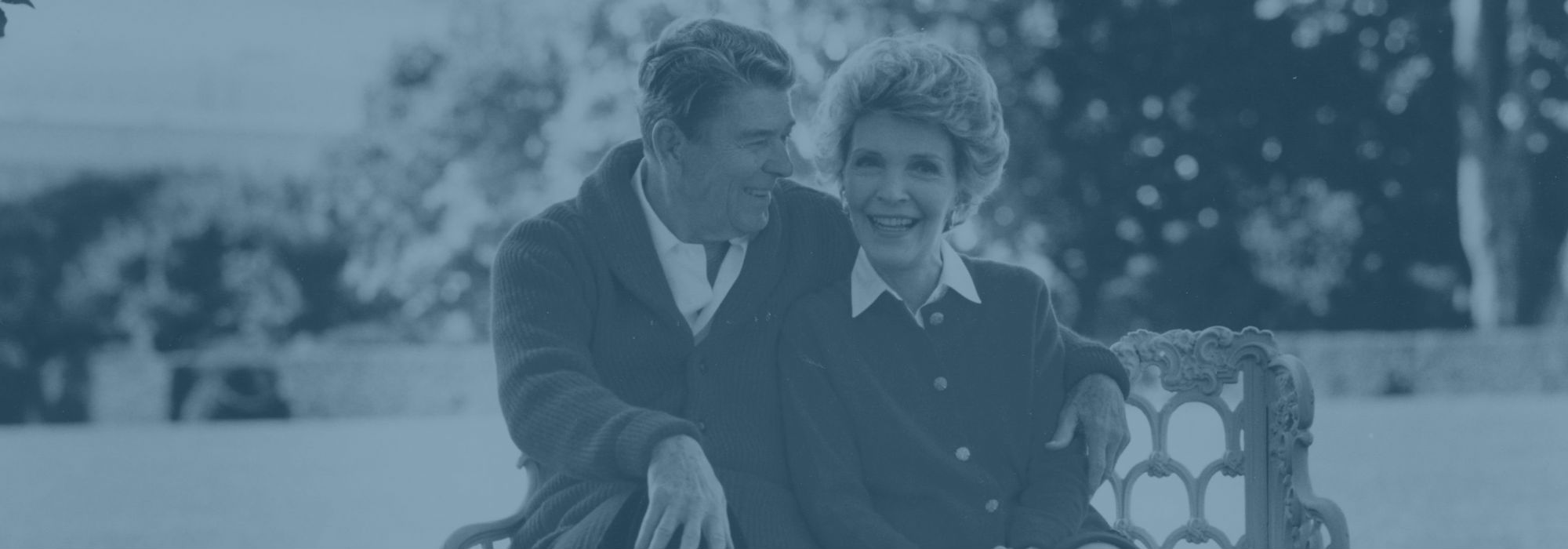By George Friedman
Nancy Reagan died this weekend and with that, the last of Ronald Reagan is gone. I say that because the two could not be understood except as one. Nancy Reagan guarded Ronald Reagan. Many whom she guarded against despised her. Some despised her because they genuinely felt they had much to offer the president. Others because they felt he had much to offer them. There were many tales told of her gleefully, from the fact that she was into horoscopes and fortune-telling, to the idea that she was acting to enhance her own power, to the idea that Ronald Reagan was so weak intellectually and personally that he required a guard. That sort of talk was inevitable. But it is easy to forget that a good president must be guarded by someone secure in his trust and singularly focused on his needs. Nancy Reagan did not usurp his presidency. She made it possible. And from my perspective, she made it great.
A great president must have three characteristics. The first is that he must be able to lead a fractious people. That means that he must be able to speak to the people in language that they understand and that moves them. He must be a great rhetorician. Winston Churchill was a great rhetorician. But if you listen to him speak, you know that his rhetoric would not work in this country today. Rhetoric is specific to time and place, and the president must be of that time and place if he is to lead. The ability to speak plainly but transcendently is not something that can be faked. The same speech in the hands of a charlatan will fail. Rhetoric and leadership are one. “Mere rhetoric” is a contradiction in terms.
Reagan could use language to touch his listeners. He could therefore lead and he could therefore be president. But it was vital that he reach the many, not just the few. So a great rhetorician may be denigrated for banality. In a democracy, great rhetoric may seem banal to the academic, but touch the soul of the ordinary citizen. That is what Reagan could do, and that is why he was held in low esteem by the intelligentsia.
The second thing a president must be is ruthless. The president must have a vision and express it, but he is beset on all sides with people of differing views and ambitions, who will take him down if they can. Mercy is a luxury he can’t afford, even though he must hide his ruthlessness as completely as possible. There are two examples of presidential ruthlessness I always cite. One is the quote from Abraham Lincoln when he said, “I hope to have God on my side, but I must have Kentucky.” Kentucky was a slave-holding state and if it joined the Confederacy, the center of the Union would collapse. Lincoln hated slavery, but he could not defeat it without making concessions to a slave-holding state. My second favorite example of presidential ruthlessness is Franklin D. Roosevelt. In order to defeat Adolf Hitler he allied himself with Joseph Stalin. Both were monsters but FDR knew that he could only defeat Hitler with Stalin’s help. He sided with a genocidal maniac to defeat a genocidal maniac, all in the name of democracy.
Presidents cannot be consistent with their moral principles. If they are, they will be destroyed. Ronald Reagan was wildly inconsistent, as were Lincoln and FDR. He was dedicated to the fall of the Soviet Union, seeing it as a moral abomination, while many of his critics viewed him as simplistic. But he remained in a loose alliance with communist China, because he knew that he needed the pressure of the Chinese in the east to drain the Soviets and that a shift in alliances by the Chinese would have crushed his hopes. Like Lincoln and Roosevelt, he acted in opposition to his principles in order to achieve what he intended to achieve.
Finally, a president must have a moral core. He may not always be able to serve this moral core, and rarely can he pursue it directly, but if it isn’t there then he becomes a monster, an opportunist. A moral core cannot be complex. The more complex, the more it undermines rhetoric and ruthlessness. There must be an elegant simplicity. Lincoln’s moral principles were saving the republic the founders created while destroying slavery. In some ways, he had to hide these principles, but in the end his rhetoric, ruthlessness and moral purpose aligned. FDR’s moral purpose was to prevent an uprising of the poor and save the same republic, and to defeat totalitarianism. There was an alignment.
Reagan’s moral purpose was to enhance freedom by destroying its main enemy, communism. As with Lincoln or Roosevelt, it was the simplicity of his intention that made it so powerful and caused him to be demeaned by more sophisticated people. The three men I cite have this in common. Each made their goals clear. None of them made clear how he intended to achieve those goals. The difference between a president’s moral core and those of others is that if his leadership and ruthlessness are sufficient, he may turn what are merely sentiments in others into reality.
To achieve a moral end, there must be alignment between rhetoric, ruthlessness and morality. That is not easy to achieve, particularly when you mean it and have the power to do what you intend. But it requires two things: a conscious and intuitive understanding of the relationship between the various parts and a cocoon in which to spin the infinitely complicated web you have to spin. That cocoon must consist of those you absolutely trust, and a good president rarely trusts anyone absolutely. But without those trusted few, the president will be constantly bombarded with the immediate and seemingly urgent, and that will prevent him from making history. The web of history has to be woven in private, and the great president is always alone in his mind, even as he greets his visitors.
The role that wives have played in creating that cocoon is usually hidden from public view. Who knows the protection that Eleanor gave Franklin or Lady Bird to Lyndon. Marriages are enormously complex machines, and none more so that the presidential marriage. What made Nancy and Ronald unique is that they hid nothing. Unlike Eleanor and Franklin, there is no question but that they were living a great love affair. Unlike Lyndon and Ladybird, there was no pretense but that Nancy had created the space within which Ronald thought, and that she guarded that space with a ruthlessness equal to Ronald’s manipulation of Mikhail Gorbachev. And there was a final piece. Neither feared the other.
The presidency is a busy place and the president is a busy man. His refuge is not his extended summer vacation, but is always with him, in a space in his brain that is always operating on a separate plane from the others. It is the place where his real hopes live and where the rhetoric and ruthlessness are crafted and merge. What Nancy Reagan, ever at her husband’s side, gave him was that space. She understood this space existed, although she may not have known what was there. Still she knew that it was that space that would create history, if history were to be created. And so she accepted the resentment and contempt of his courtiers on his behalf, firing those who needed firing, protecting those she thought worthy. She didn’t usurp his presidency, but made it possible.
There are those today who would feel that it is a demeaning role for a woman. She was her husband’s servant. But as in all good marriages, it was never clear who the servant or master was at any given moment. On a guess, I would think that Nancy wanted Ronald to be president more than he did. I would suspect that Nancy, a cautious woman, was uneasy with Ronald’s grandiose intentions. Equality is not a static thing in a marriage. In the end, Ronald and Nancy lived their lives by their own standards, and they lived it gloriously. They didn’t care what the pettifoggers had to say. They cared what each had to say to each other. And they cared about what history would say.
These were odd people, but those who rise this high and do this much are never ordinary, in spite of the veil they draw over themselves or the condescension of their critics. Neither was the person they chose to appear to be, and in the end, the rest of us can judge them only based on what they chose to let us see and on the world they helped create. Underneath the arid movements of geopolitics are people, and most of those come to be and pass away. A few touch the machine that shapes the world, and for a moment, they shape the machine. When they do, they are dismissed by those an infinite space beneath them. Ronald and Nancy Reagan couldn’t have cared less. For those of us who care, that is what was most important about them. A man and a woman whose opinions of each other mattered more to them than opinions of anyone else, no matter how learned he claimed to be.






 Special Collection – The Middle East
Special Collection – The Middle East